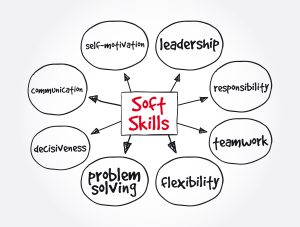
We often hear a lot about soft skills vs hard skills today. What’s the difference and how do they apply to the nursing profession? Both are required for nurses to provide quality care to patients. They are also very different by definition. Soft skills are basically innate personality traits such as interpersonal (people) skills and behaviors. Soft skills are very difficult to learn or to perfect. Hard skills are learned skills and often defined as specific abilities and skills that enable a person to excel in a profession.
Nurses need to have strong communication skills, work well with others and be a good team member. Nurses should be flexible and able to adapt as necessary. They need to be able to think critically and problem-solve effectively. Nurses need to be compassionate, have empathy, and understand professionalism. Hard skills are learned through education and experience. Nursing requires a technical education in science and medicine in a lifelong learning process. The clinical experiences nurses encounter build on their scientific knowledge base to expand both their hard skills and soft skills. In the nursing profession where teams have nurses with strong soft skills as well as exceptional (hard) clinical knowledge and skills, the quality of patient care is at its highest level. This is one of the strongest arguments for mandating a BSN.
Soft skills are universal and apply to any job or profession. They are difficult to learn and are usually considered innate. However, on-the-job experience helps nurses to hone and perfect these skills. Communication, which includes both speaking and listening skills, will continue to improve over time as nurses continue to work and become comfortable with doctors, other nurses, other healthcare professionals, ancillary staff, patients and their families.
Hard skills, for example, are learned skills including specific capabilities and abilities and other skills specific to the job or profession. These include computer skills, software knowledge, graphic design, data analysis, customer service, marketing, copy writing, sales, marketing, foreign languages, engineering, social media marketing, and finance. They are skills that must be acquired through education and experience and then workers demonstrate them measurably. Some of these apply well to nursing such as technology (computer and software skills), language skills and customer service.
Examples of soft skills include communication (listening and speaking), compassion, attention to detail and critical observation/assessment, critical thinking and problem-solving, conflict resolution, leadership, professionalism, teamwork, time management, ability to take constructive criticism, stress management, accountability, empathy, confidence, ability to educate others and resilience, adaptability, flexibility.
Evidence-based of examples of personal successes with hard and soft skills are important points to add to your resume and to incorporate into any discussion of promotions and value-based raises. For those hiring nurses,observation and discussion of these skills can help to provide a better picture of how the candidate will fit in with your staff and enhance the level of quality care in your organization.
Learn more about soft skills and improving communication skills from Medical Improv founder and nurse consultant, Beth Boynton in podcasts with Kevin Pho, MD. Find more on her Youtube channel.
